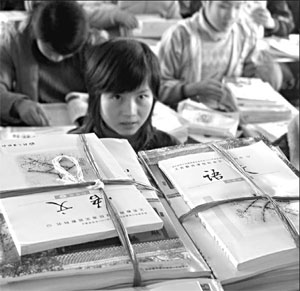School kids in need of more sleep
By Wang Zhuoqiong (China Daily)Updated: 2007-03-19 06:48
For 12-year-old Liu Xingjian, the most difficult thing in life is getting up at 5:50 am every school day.
"I don't want to get up so early," the six-grade Beijing primary school student said. "I want more sleep."
|
Textbooks are piled up at a middle school in
Xinshao, Henan Province. Experts have suggested cutting school hours to
give children more time for play and leisure. |
Like most of his 28 classmates, Liu arrives at school a full hour before lessons start at 8 am.
In a 2005 survey of 2,500 schoolchildren in six cities, including Beijing and Shanghai, it was found that about 66 percent of primary school students and 77 percent of high school students were short of sleep.
In response to the findings, some cities, including Shanghai, subsequently cut their school hours to give children more time for leisure and play. In Shanghai's Luwan District, for example, primary and junior high school students now go to school 15 minutes later than they did previously.
In a recent survey conducted by the China Daily website, almost 70 percent of the 1,133 respondents said they agreed with cutting school hours, while 22 percent disagreed and 10 percent had no comment.
"The best way for children to learn is through play," said "Craig" in his online comments. "Through playing, they can develop their characters, learn to be independent and improve their communication skills, which is something many Chinese children lack."
Another netizen disagreed.
"Young mothers and fathers have little time to play with their children," "skylark" said in his online message. "Reducing study time and letting them go home early is not a good idea. I think schools should organise more non-academic activities for children."
Despite the fact that their children spend long hours at school, many parents arrange for them to take extra-curricular studies.
Liu Xingjian, for example, spends his weekends taking classes in math, English and Chinese, as well as learning to play the horn.
But even with his busy schedule, Liu's mother, Wang Qunyu, who teaches at a high school in Beijing, thinks her son is still not doing enough to win a place at a good quality high school.
"I am not sure he will be able to get into a top school this autumn, it is so competitive. They want students who have good English and math and also possess special skills.
"Of course I want my son to have more sleep, more exercise and more fun," she said. "But the common saying is that if you give your child a happy childhood in China, you give him a failed adulthood."
Education professionals say that people might take some time to accept shorter school hours. Qi Zhenjun, principal of the Beijing-based Chaoyang Elementary School Attached to Chaoyang Normal Institute, said the problems are rooted in a system that seeks to evaluate students solely on their academic scores.
It will also take time to change people's traditional mindset that a college diploma is a ticket to a good job, Qi said.
|
||
|
||
|
|

